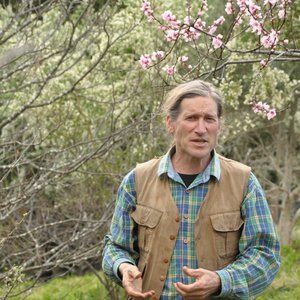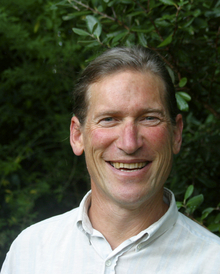The peak oil blogosphere is currently awash with responses to David Holmgren’s latest essay Crash on Demand (which I wrote about here on December 17th). The distortion of his views seems to be increasing with each post, in my view.
In my reply to Dimitry Orlov, I wrote:
No one seems to be noticing that he [Holmgren] did not propose a new approach at all. He is still advocating for the same approach he’s written about for the last 30 years: reduce consumption and be domestically responsible. I don’t agree with the huge shift in [Holmgren’s] position that Albert [Bates] has put on his chart. The only difference is that this time he has associated his suggested strategies with the idea that if enough people put them into practice, it just might tip the already fragile global finance system over the edge. I think he’s throwing this idea out there primarily to attract what he calls “the disillusioned social and political activists who are just starting to recognize Permaculture as a potentially effective pathway for social change.”
Stay tuned – I’ll have more to say very soon, as I’m preparing a new post on the subject. In the meantime, I thought I’d share an interview with Holmgren that took place in 2011. Below the video are my notes…I call them “notes” rather than a transcript, because they are not 100% verbatum.
Interview of David Holmgren by Luke Miller Callahan at Groaction.com.
The Upcoming Transition Away From a Fossil Fuel Based Society: David Holmgren Talks Strategy
2011 GroAction Interview with Luke Miller Callahan
http://groaction.com/discover/3110/david-holmgren-interview-permaculture-principles/
How Do You Spend Your Time?
1/3 time spent on home based self-reliance and local community
1/3 time spent speaking and teaching
1/3 time spent on research, especially “over the horizon” research on the world we are moving into.
Enjoys the balance of doing hands on work and conveying the big picture of where we’re heading in the world to people, to empower them to do things with their hands.
Empowering People to Do the Small, Local, Bottom Up Actions
I think that, while the big political movement stuff is always going to be in some ways more exciting – and there’s certainly some exciting aspects of that emerging in the world now around the notion of demanding that someone do something, I don’t think those things really help change the structure much, unless people are also making the changes themselves. Because the changes people make themselves are double insurance – they are insurance against dysfunctional or anti-social behavior by elites (and there’s certainly plenty of evidence for that), but they’re also the way we model the world that we’re actually wanting to be, because in a lot of ways it’s a matter of being able to crawl before you walk. The sort of world we’re trying to construct, I think it’s actually impossible to construct that top-down. It has to actually be rebuilt bottom up, in parallel with the crumbling system. And then as those models become more real, it’s possible to get some degree of top-down reform/support for those things. But if they don’t actually exist, if we don’t have the working, living solutions, then it’s very hard for policymakers to say “Yes, we’ll have more of that, and less of that.” They can’t actually create the things we need. The things we need are all very small, localized, particular, and large scale systems just can’t do that.
Do the systems in place now need to come down?
Things develop in parallel to a fair degree and there’s an ambiguity between how much needs to be rebuilt from scratch, and how much is a matter of reform. The old debate between reform or revolution. Permaculture comes from the premise that you’ve got to design from first principles. A whole lot of the ground design principles built into our society, which have been functional in the past, aren’t functional in the future, and you can’t necessarily just modify them beyond certain limits. Example: material growth is very much built into the foundations of the system we’ve got. In regards to climate change, we know that a proven strategy to reduce carbon dioxide emissions is to contract the economy, but no one ever discusses it as a serious strategy. That tells us how deeply committed our system is to perpetual growth. So it’s hard to know at what point that could actually be part of a serious discussion at the levels of policy. I suspect it’s not really possible. There’s always got to be this fabrication – oh yes, we’re going to reduce our impact on the environment by all sorts of means, but we’re not going to question growth…even when the evidence is that that growth is not occurring…
Faith in People
It doesn’t mean that the situation is hopeless for the possibility of positive things coming out of a national level or an international level. But the assumption is, that because those are big and powerful systems, and because we need positive change very fast, that that is the predominant place we have to have faith in. I think the reverse is true. The predominant place we have to have faith in is for the ability of people, as like fast moving intelligent new life forms, like the early mammals replacing the dinosaurs. That humans individually and collectively without rigid institutional structures can think on their feet, and can incorporate both the long term vision stuff that we associate with big institutions and long term planning – that humans are actually capable of that… We’re capable of responding to the immediate environment around us in ways that institutions can never be capable of, but we’re also capable of some of those things that we associate with institutional capacity – the long term wisdom and ability to understand complexity. And maybe that’s part of the inheritance of the modern world, because people in the past didn’t necessarily have that on an individual basis. But it is possible now if people want to look and learn for humans as individuals and communities and families to have virtually the intelligence that we previously associated with institutions and societies.
Crisis as an Opportunity
Any system that has rigidity in its structure around past, proven ways of doing things is obviously reluctant to change out of those patterns. It takes a big shock break that apart. We know that occurs in nature, we know that occurs in our own lives, the way a health crisis can trigger a reorganization of our lives, and we can see that happening in society around us… The crisis becomes an opportunity to leverage the system in certain ways…Interest in things like Permaculture is counter-cyclical to the economy…focus changes to family, connection to nature, basic needs…It’s not that they run and change, but they turn their heads in a different direction.
Effects of Peak Oil
Of course, crises can unfold in different ways. You mentioned peak oil. A lot of peak oil researchers tended to think that that would come through astronomical prices for oil. Recent evidence suggests the current economy can’t cope with oil prices much higher than they are now, because it produces recession if not depression. Rather than seeing astronomical oil prices – which is imaginable in a world structured very differently from ours – our current economy depends on oil being very cheap. It is quite surprising the way that comes about. People think energy and food will become more expensive, and therefore those things won’t be available…What’s often missed is that long before there’s no food in the supermarket, all of the discretionary, luxury, service parts of the economy have contracted back, and energy and food are still available, because you’ve gotten rid of all the other stuff. When things contract, you dispense with the luxuries, the extras. And of course, that’s what most of our economy is.
…Although the strategies of people growing their own food are important, they’re not important in the way that some simple survivalist motivation that might drive some people to do that. They’re really around a reconnection around a more frugal, simple way of living where you can provide for some of your own needs and reserve the money you have for the things you can’t produce yourself. Historically, people growing their own veggies is one of the things people can do for themselves. Beyond food, it’s about having some skill that you can trade with some other person. Whereas a lot of people have skills that can only be bought by a large institution like a bank or a corporation or government department…Whereas, if you know how to fix cars – and that might be counter-intuitive, because you think there are going to be less cars driving around – that might be true, but there might be more old cars that need to be repaired, rather than new cars that don’t need repair. So skills as a mechanic is a tradable skill for self-reliance, maybe almost as much as being able to grow food and have a surplus to provide for others.
Retrofitting the Suburbs for Sustainability
There is an assumption that modern life is about movement from one place to another each day, and that it is a completely natural experience…and that to be a member of society, that’s what you have to do. Whereas, a normal society operating with limited energy will have most things done where people live. Some people will move each day, but a much, much smaller proportion. What that really means is that the places where people are living, and especially in our car based societies with their extensive suburbs – that is, these spread out areas of suburban development and small towns – that’s where we have to re-create the economic activity so that we don’t need to move, rather than the notion that we just need efficient forms of transport. Efficient forms of public transport would be lovely to have, but we are moving into the crisis so fast that a lot of what we’ll have to do is adapt in place of where we are.
I’ve been for many years an advocate of the idea that the suburbs, rather coming to an end, as suggested in the pioneering peak oil movie “The End of Suburbia,” is a place that is adaptable (in a counter-intuitive way) to a low energy future. This is partly because of an accident of history – certainly not to do with sensible planning and forethought, but I don’t think the prognosis for suburbia are as bad as people suggest; on the contrary, the idea that dense urban cities are more efficient, is, I think, questionable, if not dangerous in a world of serious energy descent.
What Will the Transition to Self-Sufficient Suburbs Look Like?
It will happen at a number of levels. Firstly, because it can be started incrementally, you can start with one household garden within the limits or under the radar of regulations and social censure from neighbors – without having to get the whole of society to agree. When you’re in a multi-story apartment, there’s a very limited number of things you can do until everyone in that apartment or whoever owns it agrees. So the piecemeal nature of suburbia allows models to develop ahead of when society understands it needs to do this…Secondly, the level of space that exists give a lot of opportunities to start productive activities…Thirdly, shared households and having boarders can create economies of scale in the household economy…
The Biggest Barriers to Retrofitting the Suburbs
A lot of people have moved beyond the obvious barriers, such as pride of individual ownership, and always wanting the better and bigger for themselves. But other barriers remain:
1) The degree of disconnection between neighbors and the regulatory structure of sharing households, mother-in-law apartments, etc.
2) The sense of privacy and psycho-social aspects of sharing housing. We are uncomfortable in exercising power – what if I have to ask my tenant to leave?
Indebtedness
In a counter-intuitive way, the loss of asset-values is actually what is needed to bring the values of real estate down to where it’s possible for people to actually live in those places without enormous debt. Some of that, of course, is tragedy for current owners, but might actually be opportunities for others who currently don’t own. In a world where houses might end up at 20% of their past values, then people might be able to contemplate very frugal living with minimal income to support being a…[?]
Suburbia is not just going to disappear overnight…it’s going to be sitting there, and somethings going to be done with it, people are going to be living there some way or other. We’re not going to transform our cities overnight, we’re going to transform our behavior overnight.
Agriculture
The current industrial food supply will not be abandoned soon. To build the parallel system, the backyard garden agriculture to provide a part of people’s food needs is the breeding ground for a new generation of farmers – that is one of its prime functions, where a small percentage of people learn to become quite good at it, and start to do it commercially, and then the open space in our cities starts to become converted into urban agriculture. Managed animals will be used in urban areas for landscape management and dairy products. There is a big opportunity in the tree crop realm – much more of our diet could come from tree crops rather than field crops.
Preparing Society
What we need most is examples of surviving and thriving doing these things, so that other people can see that those people are doing well. And those people need to be organized enough so that they can pass on something of value – “here are some seeds, here’s a garden fork.” Being able to offer what is needed to replicate the success. You can’t get replication unless you have lots of local, working examples. They need to be local examples – nature changes from one place to another very, very fast – you can’t just download all the standardized information off the internet as a global set of information.
The Transition Movement and the Permablitz
The Transition movement is very much founded and based on Permaculture design principles, and is an attempt to do this in a more organized way. There’s been a lot of criticisms about the weakness of those efforts compared with the scale of the problem, but it also has been more than an attempt to actually bring these issues beyond arm-chair discussions to active engagement in the community.
The Permablitz idea started locally, and this concept has spread around the world informally, and locally more formally with funding… The positive, “get in and do it” stuff is one of the strongest motivators for a lot of people, rather than “The Grand Plan.”
Energy Descent Action Planning
But I think there’s also been efforts, and I’ve been involved myself locally, with the idea that’s come through Transition, with the idea of what’s called the Energy Descent Action Plan, or Energy Descent Action Planning, where we could do this in a slightly less chaotic and more planned way. But, my comment on that is that what that requires is a very, very different sort of thinking than what is characterized as local government or community planning in the past. Not just because the things we need to do are different, but because we have to give up that idea that we can lay it all out as a plan, and we have the resources and the budgeting and then we will just implement it. It’s much more chaotic than that.
We’ve suggested there are three broad levels in the process. The first is what we call the No Regrets Actions. Things like “why don’t we plan a garden?” Good idea anyway, not a big investment or cost or difficulty, and maybe really useful.
Then there is the Long Term Investment Actions. It might be putting photovoltaics on the roofs or planting food trees in the public streets. Something that does involve more substantial investment and a deferred benefit in the future mostly.
Third, the Responding to Crisis Actions. The opportunities that come from chaotic and unpredictable change, whether natural disasters, financial disruptions, or shortages of oil – whatever it is, those things that break the system.
Chaotic Change
Environmental activists have been very polite and not pointing out when natural disasters are immediately happening (“well, this is what climate change looks like”). Big disasters are also an opportunity to leverage change in the way people see things. That’s when people do change. Most people don’t change when things are just trickling along, getting slowly a bit more difficult.
It’s about society reading signs around it that it needs to change, and that change is coming. We have all sorts of interpretations about why that might be. I don’t think it’s necessary for everyone to believe in climate change or peak oil to start to behave sensibly, to look after their own interests and the interests of their children and grandchildren. An understanding of peak oil and climate change certainly helps to understand the complexities that are unraveling in the world, but I’ve argued quite strongly that it doesn’t really matter whether these crises are caused by geological climatic realities, or whether they’re caused by evil actors, or whether they’re caused by a God who is punishing us for our sins. It all means we’ve actually got to change what we’re doing.
So I’m sort of ambivalent about that issue of the first thing is to hammer into people that they’ve got to accept a particular explanation of what’s going on in the world. I don’t think that is necessary.









